5 Tips to Save More Money That You Probably Don’t Know Yet
5 Tips to Save More Money That You Probably Don’t Know Yet

Today, I want to share five money-saving tips with you that you may not know about yet. These are strategies that I apply in my own life and that allow me to live on half of my salary. I know this might not be the reality for most people, but the tips I’m sharing today can definitely help you save a little more each month. Don’t compare yourself to others; everyone’s financial situation is different.

Tip 1: Apply the Pareto Principle to Your Savings
You may be wondering, “What’s the Pareto Principle?” Essentially, it states that 80% of your results come from just 20% of your efforts. The idea is to identify the most important 20% to optimize your time and effort, focusing on what brings the best results.
Let me give you a personal example. I used to struggle to maintain a consistent exercise routine. I’d start on Monday, miss Tuesday, skip Wednesday, and then tell myself I’d start again next Monday. This cycle went on for months. But eventually, I realized that I had to change. My back pain from sitting at a desk all day was becoming unbearable. So, I focused on the 20% of actions that would give me 80% of the results.
The first change was simple: when I wake up, I put on my workout clothes. Since I work from home, this isn’t an issue, and it mentally prepares me for exercise. The second change was buying a set of dumbbells and leaving them in my living room. That way, when I’m tired or too busy to go to the gym, I can do a quick workout at home.
Now, how does this relate to your finances? The Pareto Principle can help you identify that 80% of your expenses usually come from 20% of your spending categories. This is why it’s important to track your expenses and categorize them—knowing your fixed and variable costs will help you focus on the largest expense categories. For example, if your monthly expenses total $4,000, focusing on the categories that represent the majority of your spending, like rent, dining out, and car expenses, can yield significant savings.
Tip 2: Choosing the Cheapest Option Isn’t Always the Best
This might sound counterintuitive, but choosing the cheapest option isn’t always the best choice. We’re often told to save money by picking the lowest-priced items, but sometimes, this doesn’t lead to real savings.
Let me explain with a personal example. I live in a rental apartment in a prime location. While I could rent a cheaper apartment further away, the savings would be outweighed by the additional costs of owning a car—fuel, maintenance, insurance, and parking. Since I work from home, I don’t need a car, so the higher rent for a convenient location works better for me financially.
So, choosing the cheapest option may seem like a good idea at first, but when you consider hidden costs, it may not be the most cost-effective decision.
Tip 3: The Two ‘O’s Strategy: Budgeting and Financial Goals
The third tip I want to share is what I call the “Two ‘O’s Strategy”—budgeting and financial goals. I know budgeting can be tedious, but it’s essential for tracking your finances. Just like trying to lose weight, you need to track your progress to ensure your financial strategy is working.
You don’t need an elaborate system—start with a simple Excel sheet or even a notebook. Alternatively, there are many budgeting apps available that can help you track your expenses.
A helpful extra tip: I set a reminder in my calendar for the day after I get paid. This way, I take two hours to review my expenses, check my bank statements, and ensure I’m on track with my financial goals. I also make sure to cancel subscriptions that I no longer use, like when I recently canceled my HBO Max subscription after realizing I wasn’t watching it. 
Tip 4: Know the Value of Your Time
If I asked you the address of your home or the score of the Brazil vs. Germany game in the 2014 World Cup, you’d probably know the answer instantly. But if I asked you how much your time is worth, would you know?
Understanding the value of your time is crucial when it comes to saving money. For example, before making a non-essential purchase, I always think about how many hours of work it would take to pay for that item. This can help you decide whether a purchase is really worth it.
Sometimes, spending money to save time (e.g., hiring someone to fix something in your home) can be a better financial decision than trying to do it yourself and wasting hours.
Tip 5: Earn More Money
I know this may seem obvious, but to save more money, you need to earn more. While it’s true that cutting expenses helps, there’s a limit to how much you can save before your income needs to increase.
Inflation makes things more expensive over time, so relying on the same income without raises or promotions will make it harder to save. That’s why it’s important to focus on ways to increase your income.
Look for opportunities for a side hustle or job change. Many times, switching companies can lead to a 10-20% salary increase. If you’re in a specialized field, such as IT, there may be higher-paying positions within your industry. Keep an eye on career opportunities and focus on improving your skills to increase your earning potential.


